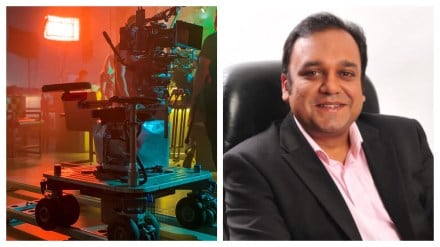By Punit Goenka
Way back in 1921, much before the liberalisation movement gathered steam in India, Mahatma Gandhi said – “I do not want my house to be walled in on all sides and my windows to be stuffed. I want the cultures of all the lands to be blown about my house as freely as possible.” These thoughts continued to guide and shape the wave of liberalisation, which swept our Nation in the early 90s. As the economy unlocked and attracted Foreign Direct Investment (FDI) across sectors, the walls of isolationism came crumbling down, giving wings to India’s rich treasure trove of culture and stories in unimaginable ways.
As we gear up to celebrate the birth anniversary of the Mahatma, we also rejoice the anniversary of private satellite television industry, which started 33 years ago in October 1992, on the back of liberalisation. One ripple that soon became a wave; has been instrumental in boosting India’s cultural footprint across the world. The impact of liberalisation was immense and can be quantified even today, with India emerging as the fourth-largest economy in the world, attracting roughly `6 lakh crore investment in FY24-25, enhancing trade and cultural exchange and nurturing a burgeoning middle class with rising disposable income.
I think this would certainly reassure Gandhi on the steps he took for our Nation, as stories rooted in the rich traditions and culture of our nation continue to travel beyond borders and create global impact. In this rapidly evolving age of technology, if Gandhi were to post a reel on three decades of liberal media, I believe he would speak about his three core principles that the M&E industry has brought to life:
·Fuelling Swadeshi, igniting opportunities:
Over the last 33 years, our nation has built a robust and self-reliant ecosystem that thrives on creating engaging stories and exporting cultural narratives globally. As a result, the M&E sector supports the livelihood of nearly 50 lakh people, and it continues to generate jobs at a rapid pace, as evolving consumer habits spur innovation. As the definition of entertainment evolved in line with the shifting contours of the Indian economy, the advent of newer consumption segments like digital platforms, films and music created a sophisticated and interconnected ecosystem, that has become inter-dependent and remains a vital contributor to India’s economy. Scale and localisation have enabled storytelling to become more personalised, thus stirring a wave of creative entrepreneurship in cities and towns across the nation. India has truly taken critical steps to become self-reliant by nurturing entrepreneurship and creating opportunities for skill development that fortify its cultural footprint across the globe.
·Sarvodaya – elevating society through storytelling
Gandhi continuously advocated for Sarvodaya or universal upliftment, which is aptly reflected through the power of content to create positive impact and moments across society. Even as employment received a major boost, the cultural democratisation of entertainment over the last three decades, has created a new, super consumer economy in India. This economy thrives on choice and competition as it enables access to quality and engaging content that mirrors society. Content is the catalyst driving change, which has opened up avenues for diverse career opportunities and redefined modern family dynamics in a way that made previously unimaginable careers and lifestyles seem attainable. Content has not just entertained audiences, it has become a window to new worlds, sparking aspirations and fuelling social mobility. It has enabled our nation to seamlessly integrate into the global economy through cultural exchanges and setting up global industries. The impact of this shift has been massive, leading to a positive societal change that continues to touch the lives of billions in India and beyond.
·Swaraj – freedom of expression
The impact of culturally rich narratives reflecting the diversity, yet the unity of our nation, has been transformative, which is evident in the rise of aspirations and living standards. Beyond the numbers, entertainment content has upheld its responsibility to unify India, amplify under-represented voices and enable billions to aspire and achieve unchartered heights. For instance, cinema has played a profound role in shaping aspirations, while music has become embedded within society as the anthem of generations. For households, the presence of television and digital media has enabled critical access to information, financial literacy campaigns, health awareness and civic participation that focuses on the betterment of society. By nurturing the nation’s local economy through creative entrepreneurship, the M&E sector has been instrumental in establishing a sense of cultural identity amongst citizens. The sector at large has played a crucial role in breaking the geographical boundaries within India. It continues to shape stories that give a voice to the unknown and blend tradition with modernity as it builds a more inclusive and participatory society.
Soft power will always be difficult to quantify, but its effects remain clearly visible. As a result, the story of the M&E sector is the story of a nation embracing opportunity, nurturing talent and narrating its stories with pride. In doing so, the sector and the people of India have embodied the very principles Gandhi cherished – Swadeshi, Sarvodaya and Swaraj, leaving no iota of doubt that his reel would have certainly generated billions of views and likes!
(The author is a Media & Entertainment industry veteran and CEO of Zee Entertainment Enterprises)
